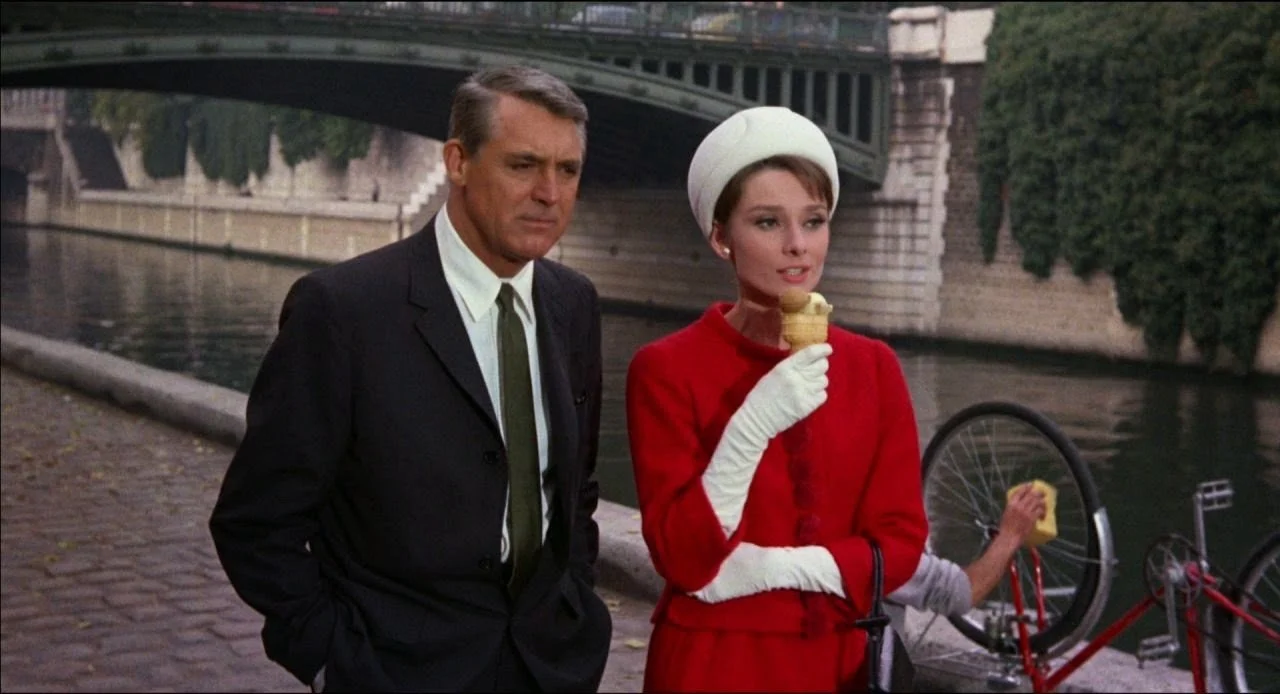Star of the Month: Audrey Hepburn will live forever in CHARADE
by Roxy Snavely, Staff Writer
For those who are fans of classical Hollywood filmmaking, the end of the era can perhaps cause some secondhand embarrassment. While Cleopatra and other films in that vein certainly aren’t the worst things ever made, their infamous failure has stuck in the popular culture as a reminder of the era’s worst traits; too melodramatic, too bloated, you’ve heard the stereotypes. Yet only six months after the release of Cleopatra, another film debuted, one which captures the greatest qualities and quirks of classical Hollywood, and not only that but combines said qualities into a delicious concoction that proves to be a true classic in every sense of the word. I’m of course referring to Stanley Donen’s Charade.
Screenwriters Peter Stone and Marc Behm had to write the script for Charade not once but twice. Initially struggling to sell the script based on the short story The Unsuspecting Wife, Stone turned his screenplay into a novel. Once that novel caught the attention of Hollywood executives, the duo was commissioned to write another script. That script became Charade, which follows Regina Lambert (Audrey Hepburn) as she plans to divorce her husband once she returns from a vacation in the French Alps. Yet when she arrives in Paris, she discovers her apartment abandoned and her husband dead. She soon learns that his murder was committed by three wartime buddies, suspecting him of hiding two hundred and fifty thousand dollars of stolen money. With all eyes on her, she must evade the men while searching for the lost money, with the help of a charming stranger (Cary Grant)
Too often compared with Hitchcock, Charade separates itself from the master of suspense by showing a much more playful tone. While the danger is still present, it’s intertwined with lively scenes of Parisian life, perhaps causing the peril to be all the more unexpected. Phone calls warning of danger will often interrupt intimate moments; villains appear at the comedy club our heroes venture to on their “night off.” This movie is just pure fun, as every scene is packed with either immense tension or immense delight, sometimes both emotions at once. This is accomplished by the masterfully written script, which has the mystery and the relationship woven together, as practically each scene develops both elements simultaneously.
Perhaps Bosley Crowther said it best when he described the film as a combination of Hitchcock and 30s screwball comedies, as the jokes range from wordplay to the physical. Plus, with a script written with Hepburn and Grant in mind, their performances only enhance the material. Completely endearing on their own, the two are somehow even more magical paired together. Somehow, they deliver every line right and, as a result, all the banter is animated, witty, and incredibly sexy. Audrey Hepburn is particularly wonderful in this, as her persona has never been more realized. She not only gets a chance to show her comedic side, but she does it with such elegance. It’s impossible not to find her completely engaging.
Grant also shines in a late-career role, and what a perfect end to one of Hollywood’s best. I can’t think of any other actor who could play this character, as it somehow comments on almost every part he’s ever played. Whether he’s a man mixed up in trouble, a double agent, or a buffoon in love, he’s never the bad guy. Therefore, seeing him play a rather untrustworthy character whose charisma is what keeps him out of trouble is certainly a play on what we expect from his archetype. Grant plays it just right, as you’re never suspicious of him. In fact, it was only on the third watch that someone asked me why Hepburn’s character keeps falling for him despite his lies. Truthfully, I had never considered this because I too kept falling for him. A masterwork of the thriller genre, Charade is the type of film that could only have worked this well with stars this charismatic, drawing on their previous experience with both kinds of movies.
In addition to the two stars, the supporting cast is great as well. Walter Matthau is quite good as the bureaucratic Bartholomew. He manages to be both an authoritative figure that represents the life or death stakes, yet he’s also humorous in the manner in which he handles the entire affair, like it’s just another day on the job. The three WWII veterans are a good mix of genuinely threatening while still seemingly coming from a Saturday morning cartoon. My personal favorite is Jacques Marin, as the Parisian police commissioner; he’s a total riot every time he’s on screen, and if you ask me, he gets the best visual joke in the entire film.
I first saw it when I was fourteen and it was the first time I was watching an older movie where I couldn’t feel its age. Charade felt timeless, though it was steeped in 1960s aesthetics. But in turn, these aesthetics showed me how magical classic Hollywood films could be. While my earlier comparison to Cleopatra may seem far-fetched, considering these films couldn’t be more different, it is the contrast that highlights the enduring freshness and vitality of Charade. Cleopatra was the poster child for an archaic type of filmmaking, a big-budget spectacle that was dated upon arrival, yet Charade remains as clever, charming, and sexy as it was the day it was released.


